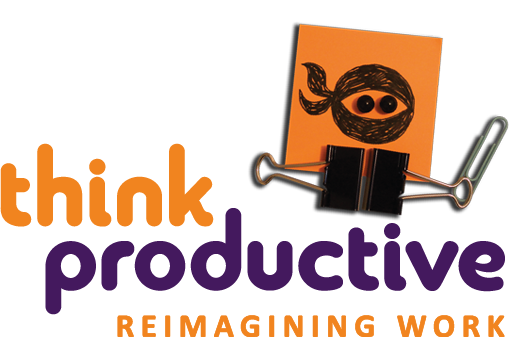At our time management workshops, we meet people who are struggling to get their tasks done.
They’re not managing their attention wisely, because they’re not recognising that their job involves 2 types of work.
In this post, Think Productive UK founder Graham Allcott explains how some insight into your working can go a long way.

In any knowledge work job, you’re really playing two different ‘roles’ at once: you’re simultaneously the ‘boss’ and the ‘worker’.
You’re responsible for:
> Deciding what your work is (‘boss-mode’);
> Doing the work (‘worker-mode’);
> Dealing with new information inputs (worker-mode) and reacting to them to decide whether to change your priorities as a result (boss-mode).
This creates an immediate conflict and serious potential for indecision about which role should have your attention at different times of the day: do you spend more time in boss-mode (thinking and analysing your work, ensuring its success, planning your next steps) or in worker-mode (putting cherries on cakes, in whatever form that takes in your current job)?
Craving Change
Naturally, the grass is always greener: the time you spend in boss-mode may remind you of all the things that you need to be doing, and you quickly become worried that you’re not spending every possible minute on these tasks so you crave the chance to get back into the trenches and get things done.
Yet, whilst you’re trying to crank through the next things on your to-do list, your mind is distracted and filled with all the other potential things you need to be doing and you make mental notes about all the new projects that need some precious thinking time.
Stress
Since most people do not have specific definitions or boundaries around what is boss-mode and what is worker-mode for them, they get stressed about whether they’ve made good decisions and often procrastinate as a result – not having good boundaries or habits here means never finishing boss-mode thinking and never being quite sure when in ‘doing’ (worker) mode that you’re actually doing the right stuff.
Many people describe their work style as ‘flitting’ from one thing to another – this is classic indecision about where your attention should truly be and a lot of giving in to interruptions of new information inputs, like new emails or phone calls.
Meet your new best friend in the battle against stress and information overload: attention management.
Find out more about attention management
Sign up to one of our new-style time management courses
7 Tips to Manage and Use Your Attention Wisely – Life Optimizer
Why You Need More Margin in Your Life (and How to Get It) – Lifehacker

